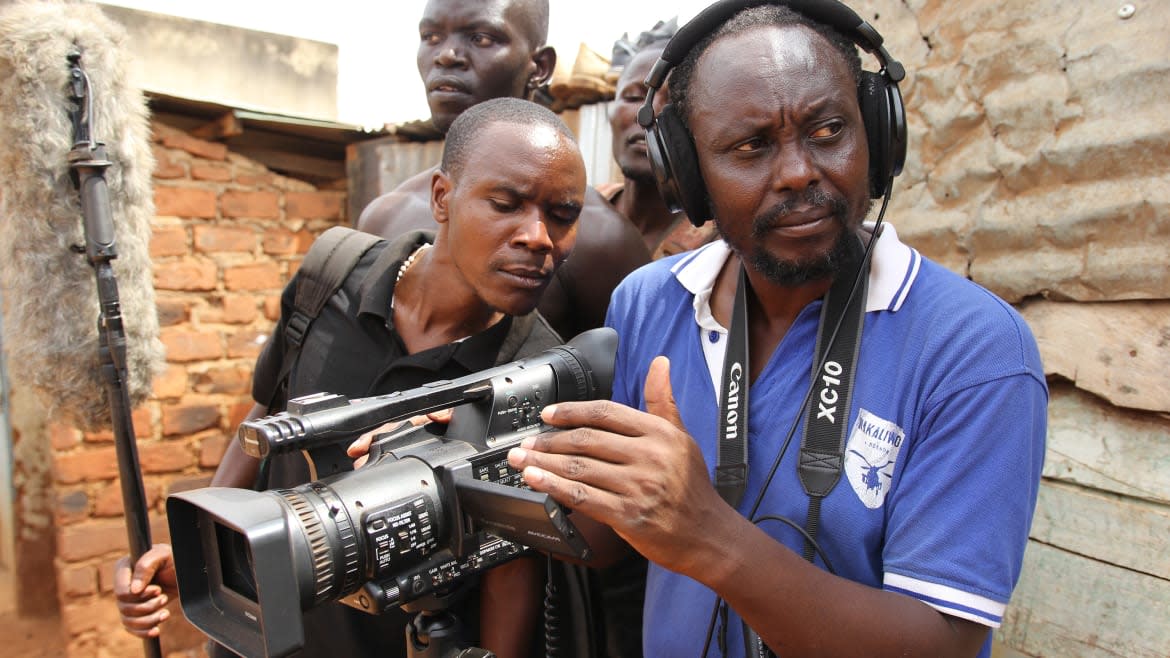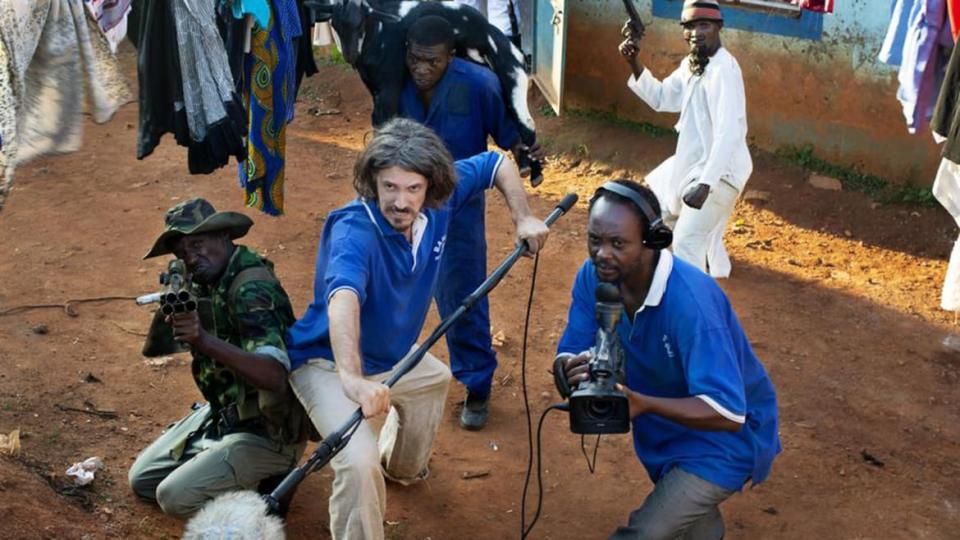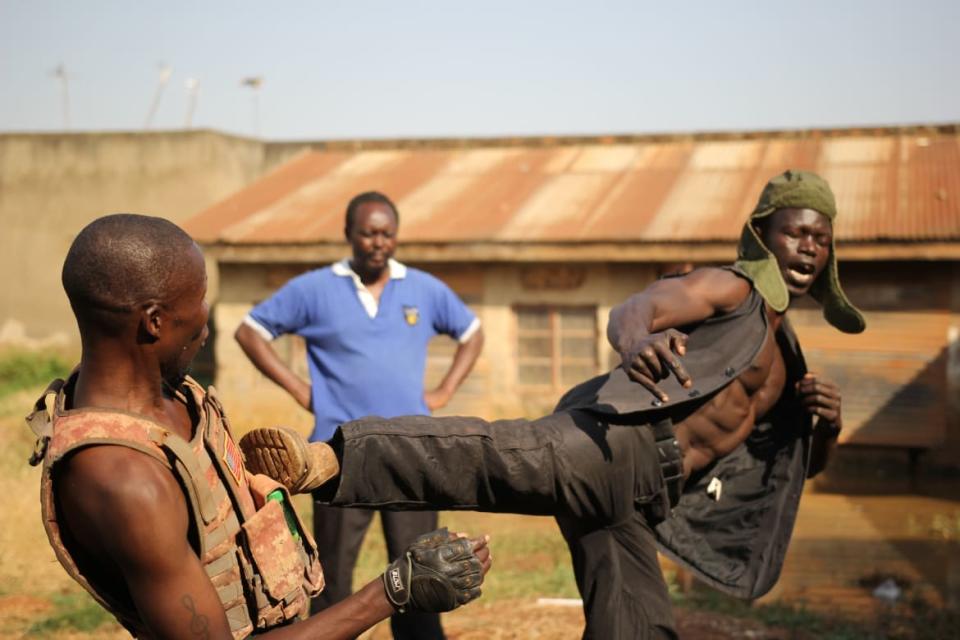How Africa’s Quentin Tarantino Is Putting Hollywood to Shame

Isaac Godfrey Geoffrey (aka “IGG”) Nabwana had never stepped inside a movie theater before. Yet there the Ugandan filmmaker stood on the closing night of last year’s Toronto International Film Festival’s Midnight Madness program, basking in a five-minute standing ovation for his gonzo shoot-’em-up-kung-fu-comedy masterpiece Crazy World. It moved him to tears. “You don’t know what it means to me,” he said onstage to the audience. “I am here, finally.”
Some in the Toronto crowd already knew Nabwana as the founder of Wakaliwood, the staggeringly prolific upstart film studio whose no-budget movies—hyper-violent, hyper-comedic, and distinctly Ugandan despite their Rambo-meets-Bruce Lee sensibilities—have inspired a cult following among genre enthusiasts online. The studio promises the “best of da best action movies,” sort of “like Hollywood, but better.” Its movies must be seen to be believed but once you do, you’re not inclined to disagree.
The bones of Nabwana’s journey had for years been covered everywhere from the BBC to Vice News, in pieces that marvel at his resourcefulness. In Wakaliga, a slum in the Ugandan capital of Kampala, he churns out hand-written scripts with madcap plots about commandos, cannibals, mafiosos, and child kung-fu prodigies. Every level of the operation speaks to a singular ingenuity: His props master welds junkyard scrap metal into convincing machine guns, getaway cars, even a helicopter. In lieu of squibs, condoms filled with water and red food coloring erupt in faux-bloody explosions. Car jacks double as tripods; tractor parts serve as jibs. Nabwana, who is self-taught, trains his actors and crew in every discipline from martial arts to makeup and editing. Nothing is impossible. All of it takes (literally) a village. And no one gets paid. Every film instead manifests through enthusiasm, hard work, and a raw love of action cinema.
‘Tiger King: Murder, Mayhem and Madness’ Is Netflix’s Craziest True-Crime Series Yet
‘Midnight in Paris’: The $10,000 Indie Film That’s Winning Hearts and Minds
Wakaliwood (known formally as Ramon Film Productions) has become what Nabwana calls the “first brick in the foundation of the Ugandan film industry”—a fitting sentiment from a former brickmaker who daydreamed about writing action movies while he molded concrete. He went on to write, produce, and direct the instantly-viral Who Killed Captain Alex in 2010, one of 47 films he’s directed in 11 years. (Most are hand-distributed around Kampala on DVD by Nabwana and the actors themselves; three have been translated and shown at film festivals internationally; two are available on Blu-ray through the American Genre Film Archive.) But even with glowing media attention and a new, hard-won respect at home, the reality of Wakaliwood is more complex than the movie-making utopia outsiders might expect it to be.
In the shadows just offstage that night at the Toronto festival, one such outsider looked on as Nabwana soaked in the ovation. New Yorker Alan Hofmanis, the one-man public relations team behind Wakaliwood’s recent international push, beamed at the sight of a dream fulfilled; he had brought Nabwana’s vision to a Western audience and they had embraced it. This had been his dream more than Nabwana’s. At one point, the pursuit of Westerners’ validation divided the two men, as the director turned to promising local projects and Hofmanis, who had dumped his entire life in New York to devote himself to Wakaliwood, betrayed a certain impatience.
Their push-and-pull can resemble that of most close friends, but it also evokes thornier cultural questions. Whose gaze matters most? What value does the mainstream place on Third World art? Those tensions, offset with the raucous humor of the Wakaliwood phenomenon, are now the subjects of the documentary Once Upon a Time in Uganda, a mischievously upbeat portrait of ingenuity and perseverance. The film was slated for its world premiere at this year’s SXSW. But with the festival canceled amid the novel coronavirus crisis, the film’s bid for distribution has stalled—an unfortunate and unexpected parallel now between the doc and many of its prime subject’s movies.
The doc’s title plays on a nickname Western media outlets bestowed on Nabwana: “the African Tarantino,” presumably for the blood-splattered outrageousness of his cinematic vision. Not that Tarantino nor Spielberg nor the other Hollywood directors Nabwana has been compared to ever had a script eaten by termites or lost a film during a power outage-induced computer crash. None have ever been confined to a $200 budget yet turned in the mind-melting mayhem of the Captain Alex trailer alone. And certainly none ever turned their DIY movie studio, a collection of small brick buildings with tin roofs, into a thriving community center that not only produces movies, but steadfastly trains the next generation of Ugandan moviemakers (and martial artists) as well—all through sheer indefatigability.
Hofmanis (a friend of Hugo Perez, a co-director of Once Upon a Time along with Catherine Czubek) enters the picture just as Nabwana and his comrades are on the hunt for a white guy to play the victim in one of his films. His rapid absorption into Wakaliwood delights him—he claims to have seen all of 40 seconds of the Captain Alex trailer before resolving to leave his life as an unfulfilled film programmer and publicist in New York behind to offer his talents in service of Wakaliwood. Early footage of a younger Hofmanis (“Uncle Alan” to some of the village’s kids, who poke his long, curly leg hair as if on a dare to touch a spider) gives way over six years to a wild-haired version of a man who lives and breathes Wakaliwood.

In camera confessionals and the occasional voiceover, Hofmanis’ fervor seems motivated not just by faith in Nabwana’s talents, but by his desire to escape a directionless existence. (His longtime girlfriend broke up with him the same day he bought her an engagement ring, he reminds us more than once.) Nabwana appreciates his PR savvy and his presence; as he tells the crew in a heart-to-heart meeting, Uganda’s upper and middle classes are only inclined to take notice of whatever white people do. Whites are “God to them,” he says, to knowing nods around the room. In contrast, when Nabwana reveals his aspirations, the attention of the world stage is rarely mentioned; instead, it’s the respect of his fellow Ugandans and the birth of a sustainable Ugandan film industry that Nabwana seems to covet. That doesn’t seem to be enough for Hofmanis, however.
Part of that is by design. While Nabwana handles local Wakaliwood affairs, he entrusts Hofmanis with international outreach. But there’s a touch of solipsism in Hofmanis’s one-track mission, too. When Wakaliwood is afforded the opportunity to produce a TV series adaptation of Who Killed Captain Alex for a local station, Hofmanis seems to take Nabwana’s enthusiasm for the project as a slight. He begins to withdraw and wanders the streets of Wakaliga alone at night. Nabwana repeatedly warns that this is dangerous, not only for him, but for the entire community. If Hofmanis were harmed, the first place police would turn for answers would be Wakaliga, he explains. Hofmanis’ solitary moping puts them all at risk.
Nabwana does not say as much in the documentary, but the financial promise of the TV series (however scant) must have weighed heavily on his mind, too. Hofmanis secured media attention from outlets around the globe and succeeded in raising Nabwana’s profile as a filmmaker, but media appearances do not pay. Nor did they result in any offers for funding. Actors had begun to resent their director, suspecting him of hiding money from them. With all of that, Nabwana had more pressing matters at hand than planning his first trip to America, no matter that Hofmanis felt like the “Beatles of exploding heads” were breaking up.
It might have been tempting for Once Upon a Time to dig no deeper than the uncommonly joyful process of movie-making fostered by Wakaliwood’s informality. To their credit, Czubek and Perez expand their lens to the discouraging realities of making art in the Third World as well—shouldn’t a talent like Nabwana struggle even a little less over time? Shouldn’t a vision so singularly bonkers that it notches world premieres at the Toronto International Film Festival and New York’s Museum of Modern Art attract some measure of resources and investment? At the very least, shouldn’t he, his wife, and his actors not all have to work multiple side jobs to create the content that Western audiences love to consume?

Czubek and Perez perform a neat trick midway through Once Upon a Time, using expensive camera and lighting equipment to stage a scene Nabwana has written, starring actors he scouted, trained, and directs himself. It recreates a memory from his childhood in the wake of the Ugandan dictator Idi Amin’s downfall. A helicopter rains bullets down on his village, sending him and his older step-brother (the one who introduced him to kung-fu and action movies) running toward the cover of a tree. They grip each other and look up to see the helicopter’s pilot laughing at them. The scene is as tense, compelling, and frightening as any from a Hollywood war movie. It seems to suggest Nabwana could be just as capable of Western-style filmmaking, with enough money and the right equipment. But that isn’t what he’s most interested in. Plus, he knows that’s what Western audiences are used to seeing from Uganda: suffering.
“If you’re watching my movie and you’re sad, then I’ve done nothing,” he says definitively near the start of Once Upon a Time. He says it with such conviction, for a moment I reassessed everything. A coda near the credits reveals that Nabwana is “still in production” on Eaten Alive in Uganda, a horror-comedy in which Hofmanis beats off a gang of cannibals with his own severed leg just before they rip his intestines out. The leg and intestines both came from a freshly slaughtered goat; the leg later became someone’s dinner. He was right, I knew as I watched him film the scene. This is like Hollywood—but better.
Got a tip? Send it to The Daily Beast here
Get our top stories in your inbox every day. Sign up now!
Daily Beast Membership: Beast Inside goes deeper on the stories that matter to you. Learn more.

